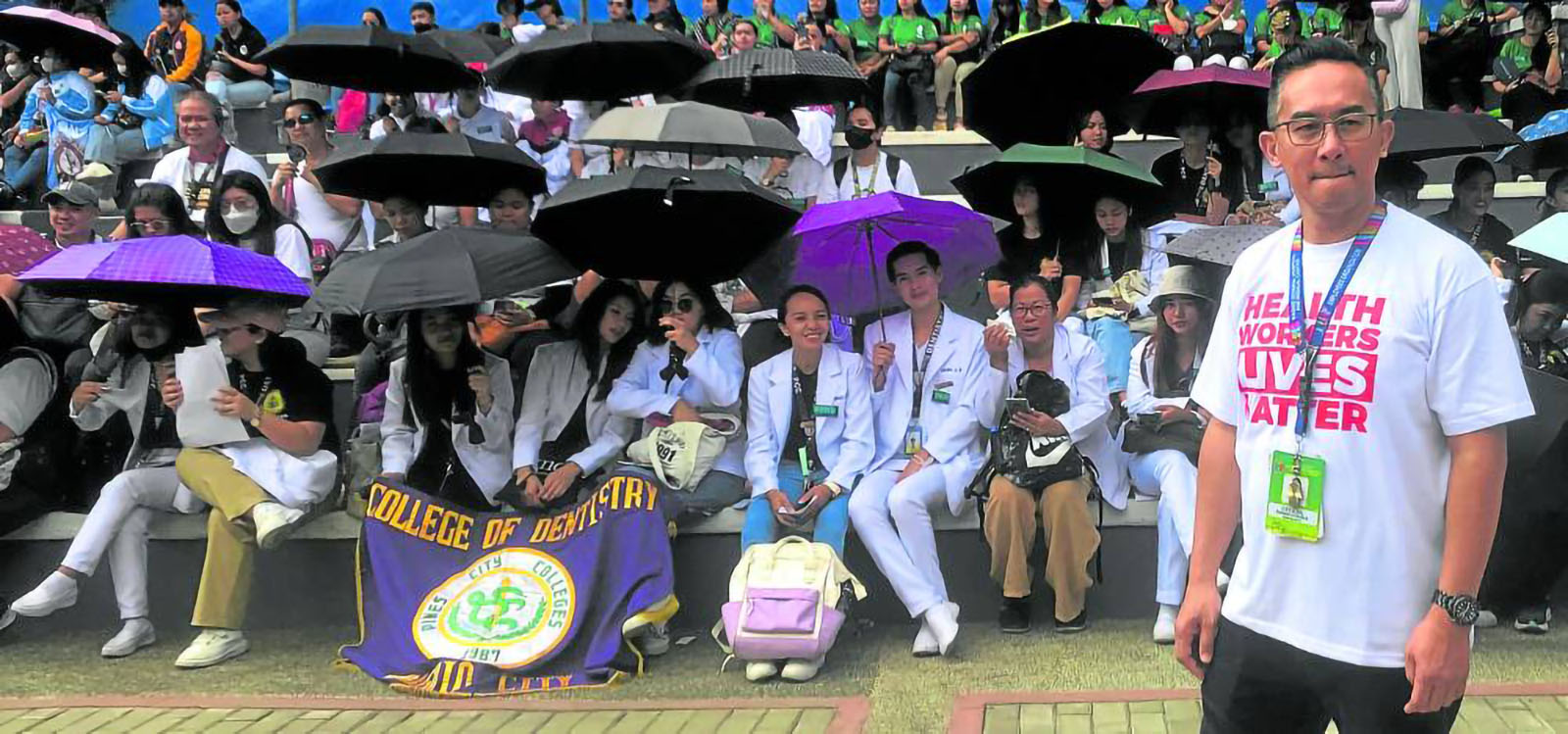
URGENT CALL Dr. Frederick Mars Untalan, president of the Baguio General Hospital and Medical Center Employees Association, joins fellow health workers and medical students in a march on Tuesday to call for a P33,000 entry salary for public and private health workers. VINCENT CABREZA
BAGUIO CITY, Philippines — About 200 doctors, nurses, medical students and other health-care workers on Tuesday joined a “unity walk” to assert their rights and to demand a mandatory entry salary of P33,000 for medical employees in government and in the private sector.
The current salary grade 1 is P13,000 for government health-care workers, said Dr. Frederick Mars Untalan, president of the Baguio General Hospital and Medical Center (BGHMC) Employees Association. Public health-care workers include nurses, medical technicians, skilled workers in allied medical fields and administrative support personnel, according to health and government budget circulars.
“Is that sufficient as a monthly living wage? That’s the only relevant question,” Untalan said in Filipino.
READ: Health workers appeal to gov’t for wage increase
At the height of the COVID-19 pandemic in 2020, budget officials no longer applied salary grade 1 to entry-level nurses.
The unity walk from the city’s Post Office Loop in downtown Baguio to BGHMC was organized by the 2-year-old Coalition of Health Workers Organizations in the Cordillera in time for this year’s National Health Workers Day.
In a statement, the coalition said it was pushing forward “the pressing demands for just compensation and benefits, job security and an end to poor working conditions.”
The unity walk also advocated for the passage of a second magna carta that raises the pay and benefits of private sector health workers which was introduced in 2019 and again in 2022 by the Makabayan bloc in Congress and by Cebu Rep. Eduardo Rama Jr. in 2023.
Deficiencies
The coalition urged the Department of Health (DOH) and the Baguio government to raise public health-care funding and increase medical infrastructure, stressing that it was “crucial for the government to acknowledge that health care is a fundamental human right and allocate resources accordingly.”
The BGHMC is in the middle of a construction boom as it builds new medical facilities.
“The pandemic has underscored the deficiencies in our public health system, exposing both health workers and patients to grave risks,” the coalition pointed out.
It added: “The scarcity of protective equipment, persistent understaffing and budgetary constraints have left health workers susceptible to [hazards like workplace] infections and burnout.”
Securing a P33,000 entry salary across the board is also important because it may encourage new blood in the medical sector to work in the country, instead of aspiring for overseas jobs, said Judith Magwilang, governor of the Philippine Nurses Association (PNA) in the Cordillera.
She said Congress had once given the health-care community only one option: to raise the salary of either government or private medical workers.
Addressing the students of different medical schools in Baguio, Magwilang said PNA and many health-care organizations opted for a hike in the starting salary of public and private hospital workers instead, “so you won’t decide to work abroad.”
Untalan outlined health-care workers’ rights under Republic Act No. 7305 (the 1993 Magna Carta for Public Health Workers), including the right to be consulted regarding all public health policies set by the government.
‘Agents of change’
He said health-care workers must be “agents of change,” because high-level government officials rarely know the concerns of employees at the bottom of the ladder and it was their job to “make them understand.”
Untalan said even information technology specialists required by government hospitals are being lured abroad because of a comparatively lower salary in government.
Mayor Benjamin Magalong joined the group and advised them to continue speaking out because what they achieve would improve the lives of future health-care workers.
“Silence will become a more powerful tool for corrupt government politicians and corrupt national government officials” whose actions affect public health programs, he said.
Magalong said government corruption had eroded all progress made in governance.
“We need to speak up,” he said, stressing that by not doing so, “our negligence will be felt by our young health-workers.”
The Cordillera is served by 8,387 health workers, according to a 2015 DOH report.
In a 2022 field health services technical report, the DOH said the ratio of doctors to population (projected to rise to 1,836,857 in 2022) fulfilled the standard 1:20,000 population ratio “with 109 doctors covering around 16,852 individuals per doctor.”
“The ratio of nurse to population in [the Cordillera was] significantly lower than the ideal ratio of 1:10,000 population,” the report said.